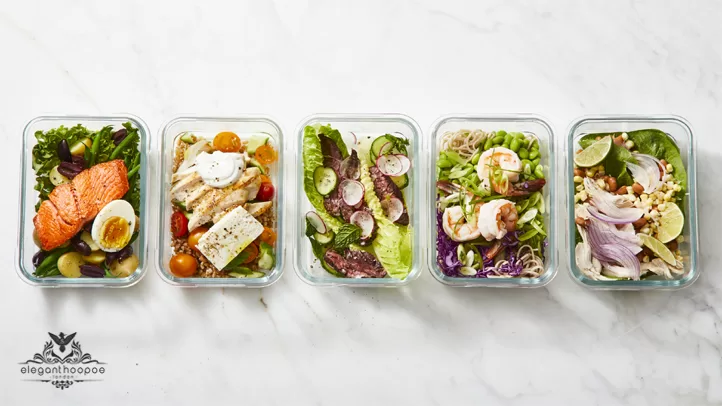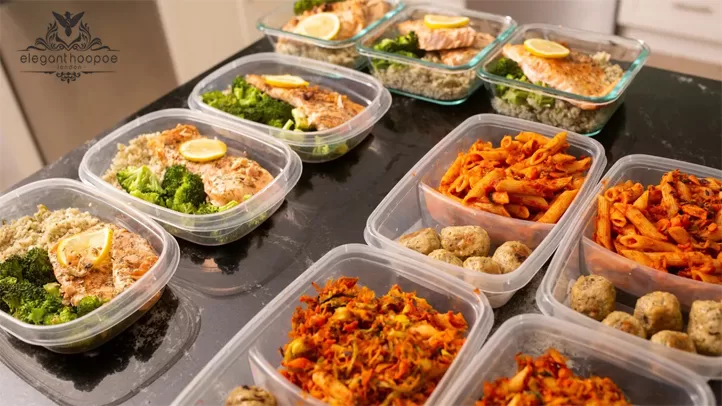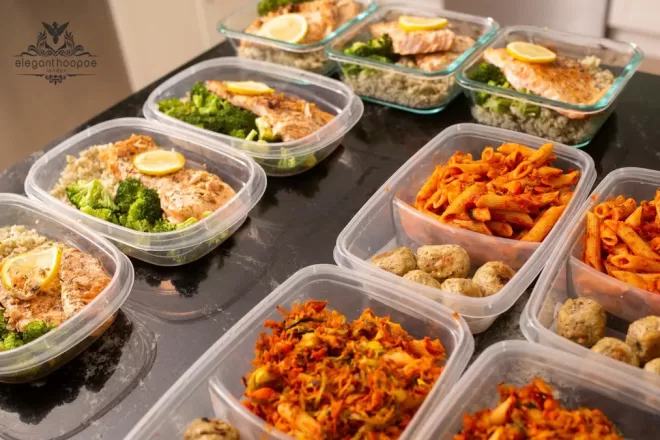How Can Meal Prepping Help You Eat Healthier and Save Time Each Week?
Meal prepping is a simple, powerful strategy to eat healthier, reduce stress, and save time and money. Here’s how:
Plan ahead: Choose meals for the week and shop smart.
Batch cook: Prepare large portions of grains, proteins, and veggies.
Use quality containers: Keep meals fresh and organized.
Label everything: Avoid food waste and confusion.
Prep smart snacks: Like fruits or yogurt parfaits.
Avoid delicate items: Like leafy greens and avocados that don’t store well.
With a little prep once a week, meal prepping makes healthy eating fast, easy, and stress-free.
After a long day at work, the last thing most of us want to do is spend time in the kitchen. Feeling lethargic and exhausted, it’s all too easy to reach for something instant or order takeout. But what if there was a way to sidestep those unhealthy choices? Enter meal prepping as a game changer for anyone looking to make balanced decisions without the stress of daily cooking.

Why Meal Prepping?
The Struggle is Real
Let’s face it: after a grueling day, the thought of preparing a nutritious meal can feel like an insurmountable task. Instead of whipping up a wholesome dinner, many find themselves succumbing to quick fixes that often lack nutritional value. Meal prepping provides a solution that not only saves time but also promotes healthier eating habits.
How It Works
By dedicating a few hours each week to preparing your meals in advance, you can simplify your weeknight routine. Imagine coming home and having a delicious, healthy meal ready to go. With meal prep, that dream can become a reality.
The Advantages of Meal Prepping
Save Time and Money
One of the biggest advantages of meal prepping is the time and money saved. By buying ingredients in bulk and preparing meals in advance, you can cut down on last-minute grocery runs and save on takeout costs. According to studies, families that meal prep save an average of 30% on their grocery bills!
Make Healthier Choices
Meal prepping helps you make intentional choices about what you eat. When healthy meals are prepped and ready, the temptation to indulge in junk food diminishes. You are more likely to reach for a nutritious meal rather than a bag of chips or a frozen pizza.
Meal Prepping Reduces Stress
With meals already prepared, the daily question of “What’s for dinner?” is eliminated. This can lead to a more relaxed evening routine, allowing you to unwind and focus on other important aspects of your life—like spending time with family or enjoying a good book.

Getting Started with Meal Prepping
Plan Your Meals
Before you dive into cooking, take a moment to plan your meals for the week. Consider your schedule and determine how many meals you’ll need. Are you prepping for lunch, dinner, or both? Once you have a plan, you can create a grocery list based on the recipes you’ve chosen.
Batch Cooking
Batch cooking is at the heart of meal prepping. This involves cooking large portions of a dish that can be portioned out for the week. Popular options include stews, casseroles, and stir-fries. These meals can be refrigerated or frozen for later use.
Invest in Quality Containers
Proper storage is essential for meal prep success. Investing in high-quality, airtight containers will keep your food fresh and make it easy to grab meals on the go. Consider using clear containers so you can easily see what’s inside, reducing the chance of food waste.
Label and Organize
Labeling your meals is a simple but effective way to stay organized. Use masking tape or reusable labels to write the meal name and date on each container. This ensures you’ll know what to eat and when it needs to be consumed, minimizing the risk of spoilage.

What to Prep and What to Avoid
Foods That Work Well
When meal prepping, focus on foods that hold up well in the fridge or freezer. Here are some excellent options:
- Grains: Quinoa, brown rice, and whole wheat pasta can be cooked in bulk and added to various dishes.
- Proteins: Chicken, turkey, tofu, and legumes are great for batch cooking and can be used in multiple recipes throughout the week.
- Vegetables: Roasted or steamed veggies can be a colorful addition to any meal and stay fresh for several days.
- Snacks: Prepping snacks, like cut fruits or yogurt parfaits, can help curb cravings and promote healthy munching.
Foods to Avoid
While many foods are suitable for meal prep, some are best prepared fresh. These include:
- Leafy Greens: Items like spinach and arugula can wilt and lose their crunch when stored for too long. Consider prepping salads just a day or two in advance.
- Avocados: These can brown quickly once cut, so it’s best to prep them right before eating.
- Cooked Potatoes: While they can be prepped, they may lose their texture after refrigeration.
Conclusion: Meal Prepping, Your Path to Healthier Eating
Incorporating meal prepping into your weekly routine can lead to healthier eating habits and smarter decisions, even on the busiest of days. By planning, batch cooking, and organizing your meals, you set yourself up for success. Remember, the effort you put in during your meal prep day will pay off throughout the week, allowing you to enjoy delicious, balanced meals without the stress.
So, what are you waiting for? Grab your containers and get started on your meal prep journey today. Our weight loss clinic can help you with that. You’ll thank yourself when you’re savoring a home-cooked meal instead of scrambling for something quick and unhealthy!






